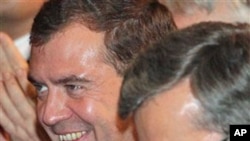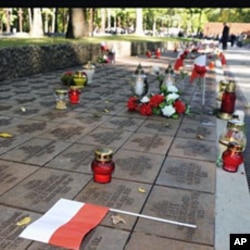Russian President Dmitry Medvedev was in Poland this week for a two-day visit. The event has been heralded as a sign of improving relations on both sides.
Russian President Dmitri Medvedev arrived in Warsaw, Poland earlier this week in an atmosphere of warming relations between the two countries. He was the first Russian president to visit Poland in eight years.
Medvedev signed a series of economic agreements with Poland, but he also met with Polish President Bronislaw Komorowski and Prime Minister Donald Tusk to discuss some more sensitive issues. One of them was the investigation into the plane crash last April that killed Polish president Lech Kaczynski and 95 others, which happened just outside the Russian town of Smolensk.
Medvedev's entourage was met by several dozen protesters holding placards that read "Smolensk: We Want the Truth." There is still a right-wing faction in Poland that believes the plane crash was a Russian conspiracy. But Wojciech Borodzicz-Smolinski of the Warsaw-based Center for International Relations explains that for the most part, the Smolensk crash actually improved relations between the two countries.
"This significant change took place just after the Smolensk tragedy. We as Poles saw on TV the feelings that were shown by the Russian politicians and the Russians themselves, and that significantly changed the climate between our two countries," he said. "We still have problems, but it is easier to talk about them if you know that your partner is a real human being."
Relations between Poland and Russia have been frosty since the Soviet empire collapsed in 1989, and Poland's previous president, Lech Kaczynski, was openly hostile toward Russia. But Polish politics have changed in recent years, and the current administration has taken a more conciliatory stance.
Last month, Poland welcomed a declaration by the lower house of the Russian parliament, the Duma, regarding the 1940 massacre of over 20,000 Polish officers in the forest of Katyn. For the first time, the Duma officially admitted that the killings were carried out under the direct orders of Josef Stalin. For years Russia had claimed that the Nazis were responsible for the massacre, which has long been a sensitive issue for Poland.
At a press conference on Monday, Mr Komorowski said that the Duma's declaration was very important. This is not only a new chapter in Polish-Russian relations, but a good chapter, he said.
But while Poland may have been concerned about history, Russia made no attempt to hide its economic interests.
At the same press conference, Medvedev emphasized that Russian companies were interested in investing in Poland. Russia wants to develop open, friendly relations with Europe, he said, especially with those countries connected to Russia's gas pipeline.
Borodzicz-Smolinski says that although Russian companies are already active in Europe, smoothing ruffled feathers in Poland could be crucial if Russia wants to take the economic relationship to the next level.
"For Russians, it is important for their international policy to have good relations with Poland, because they understand that Poland is an important actor in the European Union," said Borodzicz-Smolinski. "Russians know that if they do not solve problems with Poland, it will be hard to have some achievements on the EU market. Russia needs political recognition as a real partner. Having unsolved problems, even historical problems, Russia cannot act as a partner of the whole EU."
In this respect, he adds, Medvedev could be a more effective ambassador for his country than was his predecessor, Vladimir Putin.
"He does not have any KGB past, and he is a well-educated lawyer. This is why Mr. Medvedev has more of a chance to become a kind of partner or colleague of the EU. He is somehow representing the new face of Russia," he said.
Medvedev's visit also happened to coincide with WikiLeaks' revelation that NATO had been drawing up plans to defend Poland and the Baltic states from a possible Russian attack. Russia responded that NATO was wrong to think of it as an enemy. Medvedev, at least, hopes that his visit to Poland will help build a little more trust between his country and Europe.





